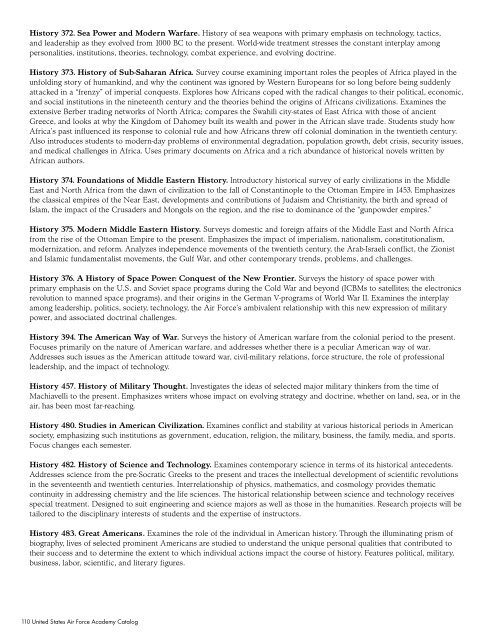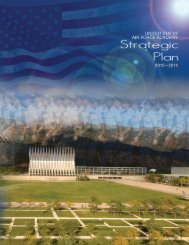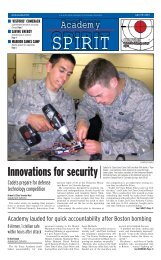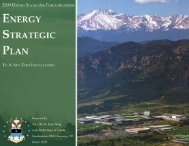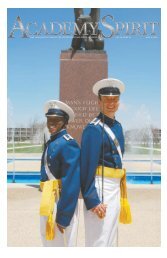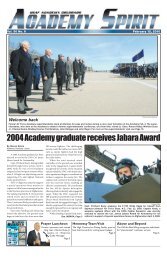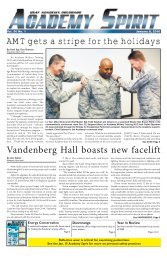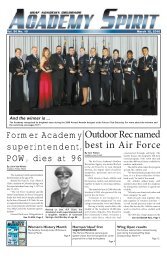2008-2009 Catalog - United States Air Force Academy
2008-2009 Catalog - United States Air Force Academy
2008-2009 Catalog - United States Air Force Academy
Create successful ePaper yourself
Turn your PDF publications into a flip-book with our unique Google optimized e-Paper software.
History 372. Sea Power and Modern Warfare. History of sea weapons with primary emphasis on technology, tactics,<br />
and leadership as they evolved from 1000 BC to the present. World-wide treatment stresses the constant interplay among<br />
personalities, institutions, theories, technology, combat experience, and evolving doctrine.<br />
History 373. History of Sub-Saharan Africa. Survey course examining important roles the peoples of Africa played in the<br />
unfolding story of humankind, and why the continent was ignored by Western Europeans for so long before being suddenly<br />
attacked in a “frenzy” of imperial conquests. Explores how Africans coped with the radical changes to their political, economic,<br />
and social institutions in the nineteenth century and the theories behind the origins of Africans civilizations. Examines the<br />
extensive Berber trading networks of North Africa; compares the Swahili city-states of East Africa with those of ancient<br />
Greece, and looks at why the Kingdom of Dahomey built its wealth and power in the African slave trade. Students study how<br />
Africa’s past influenced its response to colonial rule and how Africans threw off colonial domination in the twentieth century.<br />
Also introduces students to modern-day problems of environmental degradation, population growth, debt crisis, security issues,<br />
and medical challenges in Africa. Uses primary documents on Africa and a rich abundance of historical novels written by<br />
African authors.<br />
History 374. Foundations of Middle Eastern History. Introductory historical survey of early civilizations in the Middle<br />
East and North Africa from the dawn of civilization to the fall of Constantinople to the Ottoman Empire in 1453. Emphasizes<br />
the classical empires of the Near East, developments and contributions of Judaism and Christianity, the birth and spread of<br />
Islam, the impact of the Crusaders and Mongols on the region, and the rise to dominance of the “gunpowder empires.”<br />
History 375. Modern Middle Eastern History. Surveys domestic and foreign affairs of the Middle East and North Africa<br />
from the rise of the Ottoman Empire to the present. Emphasizes the impact of imperialism, nationalism, constitutionalism,<br />
modernization, and reform. Analyzes independence movements of the twentieth century, the Arab-Israeli conflict, the Zionist<br />
and Islamic fundamentalist movements, the Gulf War, and other contemporary trends, problems, and challenges.<br />
History 376. A History of Space Power: Conquest of the New Frontier. Surveys the history of space power with<br />
primary emphasis on the U.S. and Soviet space programs during the Cold War and beyond (ICBMs to satellites; the electronics<br />
revolution to manned space programs), and their origins in the German V-programs of World War II. Examines the interplay<br />
among leadership, politics, society, technology, the <strong>Air</strong> <strong>Force</strong>’s ambivalent relationship with this new expression of military<br />
power, and associated doctrinal challenges.<br />
History 394. The American Way of War. Surveys the history of American warfare from the colonial period to the present.<br />
Focuses primarily on the nature of American warfare, and addresses whether there is a peculiar American way of war.<br />
Addresses such issues as the American attitude toward war, civil-military relations, force structure, the role of professional<br />
leadership, and the impact of technology.<br />
History 457. History of Military Thought. Investigates the ideas of selected major military thinkers from the time of<br />
Machiavelli to the present. Emphasizes writers whose impact on evolving strategy and doctrine, whether on land, sea, or in the<br />
air, has been most far-reaching.<br />
History 480. Studies in American Civilization. Examines conflict and stability at various historical periods in American<br />
society, emphasizing such institutions as government, education, religion, the military, business, the family, media, and sports.<br />
Focus changes each semester.<br />
History 482. History of Science and Technology. Examines contemporary science in terms of its historical antecedents.<br />
Addresses science from the pre-Socratic Greeks to the present and traces the intellectual development of scientific revolutions<br />
in the seventeenth and twentieth centuries. Interrelationship of physics, mathematics, and cosmology provides thematic<br />
continuity in addressing chemistry and the life sciences. The historical relationship between science and technology receives<br />
special treatment. Designed to suit engineering and science majors as well as those in the humanities. Research projects will be<br />
tailored to the disciplinary interests of students and the expertise of instructors.<br />
History 483. Great Americans. Examines the role of the individual in American history. Through the illuminating prism of<br />
biography, lives of selected prominent Americans are studied to understand the unique personal qualities that contributed to<br />
their success and to determine the extent to which individual actions impact the course of history. Features political, military,<br />
business, labor, scientific, and literary figures.<br />
110 <strong>United</strong> <strong>States</strong> <strong>Air</strong> <strong>Force</strong> <strong>Academy</strong> <strong>Catalog</strong>


